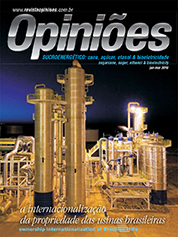Julio Maria M. Borges
Director of JOB Economia e Planejamento
Op-AA-23
Obstacles to globalization: the inconsistency of foreign trade policy
The Discourse: Producers and the Brazilian Government, in recent years, have defended the dismantling of barriers and subsidies that are damaging to Brazilian exports of sugar and ethanol. Due to this Brazilian posture, the European Union was forced by the WTO (World Trade Organization) to reduce sizeable subsidies to the production and export of sugar.
In the case of ethanol, there is an import tariff in the USA of approximately US$ 143/m3 (US$ 0.54/gallon), which the Brazilian Government has sought to eliminate. This tariff currently represents about 30% of the ethanol price in the USA and 20% of the ethanol price in the Center-South region of Brazil. What we have noticed in these Brazilian initiatives related to international trade of agricultural commodities is the economically sound intent to liberalize trade, to seek more competition on the supply side and benefits for the end consumer.
The Practice: In recent months, what we have seen are contradictory Brazilian manifestations in relation to the initiatives referred to above.
1. In the case of ethanol fuel, for example, since the past month of September, one already knew that the harvest would be smaller than expected, that the production of ethanol would be smaller than in 2008, and that the product’s consumption in the domestic market was growing at a significant rate due to the increase of the “flex” fuel automobile fleet. One knew that the compensatory measures of reducing product inventories would not suffice to eliminate the deficit in production to meet consumption.
At the time, the high Brazilian tariff of 20% on imports of ethanol could have been reduced or even eliminated, creating the conditions so that ethanol imports would take place in the event that high prices in the domestic market would justify such imports.
This measure’s benefits would be very important: the supply of the domestic market could have taken place with ethanol at competitive prices in comparison with the gasoline price at the gas pump, and furthermore, what is even more important from a strategic point of view, is that US-produced ethanol would have had the opportunity of being exported to Brazil, bringing about the desired atmosphere wanted by all (it seems), signaling that this product could become an international commodity.
To approve the import tariff reduction for ethanol now may be innocuous, because we are at most two months away from the beginning of the new harvest. It is expected to break a new production record (the climate allowing) and consequently, will result in declining ethanol prices, eliminating the advantage of importing. In other words, there is a market price risk that may render the business undoable.
2. In the case of the export of 500,000 tons of sugar by the European Union, in excess of the maximum annual limit agreed to at the World Trade Organization (WTO), the Brazilian Government is taking up a position contrary to the intended export. One should bear in mind that the sugar market is facing stressful times, a fact that had not occurred in 29 years. There is a supply shortage of the product. We are faced with a supply deficit in the world market and low inventory levels.
The current sugar price (about 30 US dollar cents per Pound of weight in New York), is approximately double the price needed to render feasible any new sugar mill project in Brazil. For the rest of the world, mainly for those competing against Brazil, the stimulus to increase production is huge. In other words, the potentially too low prices in the near future should not be underestimated.
In the event that the rainy season shall be prolonged in Center-South Brazil, preventing the crushing of sugarcane beginning in April/2010, what one would have accomplished is the implementation of sheer chaos in the supply of sugar and ethanol in Brazil and around the world. Under such circumstances, one cannot talk of a price ceiling for sugar in the international market.
The consequences of this scenario may become dramatic from the political, social and economic point of view. From the international trade viewpoint, one should not discard the return of nationalistic self-sufficiency policies, as already occurred in the past. In this environment of supply and demand, the additional export of sugar by the European Union is welcome.
First, because it eases product supply restrictions in the short term. But it only eases them, not changing the market’s fundamental conditions, given that 500,000 tons in a market of 50 million is very little to bring down prices. Thus, from the foreign trade perspective, Brazil, being in favor of the measure, would show solidarity in better supplying the world with a commodity that entails high political and social risks in times of shortage.
Finally, it is reasonable to accept that the sustainability of any economic activity requires producers to be in a position to achieve adequate returns on investments made. Producers of sugar and ethanol in Brazil were hard hit with low prices in 2007 and 2008. The high prices in the current 2009-10 harvest are needed to offset losses of the past and recompose profit margins needed to uphold the business.
On the other hand, one must adopt a trade policy, among others, that is coherent in the short and medium term. To perform in practice for the purpose of developing markets and acting effectively in defending international trade is what should be the Brazilian posture in the sugar and ethanol business, since we are among the most competitive in the world and we have the largest potential to grow the supply on a global scale. Unnecessary trade protection for Brazilian sugar and ethanol producers may have strategic consequences in the medium and long term and result in the reduction of international trade, bringing about less globalization of the economy and hence, less internationalization of ownership of Brazilian mills.




